How South Florida Palestinians cope with family stuck in a war zone. ‘Constant trauma’
When Anas Amireh gets to work, he immediately tunes into the news to hear the latest developments in the Middle East.
After an hour or two, he stops. The scenes from Gaza make him depressed.
But the Fort Lauderdale-area man can’t distance himself from the news for long as messages from his relatives in Gaza and the West Bank roll in through the day.
“When we get any kind of news, we immediately start sharing it because everybody’s worried,” he said.
As the world focuses on Hamas’ attacks and hostage-taking in Israel, already suffering families in Gaza are suffering even more, relatives in South Florida say. Hour after hour, family members in the Palestinian territories share reports about the uncertain fates of loved ones, neighbors and friends.
Who is still alive? Have their spouse or children perished? Where are people hiding from the continual bombings? Is there water? Food? Electricity?
Amireh hasn’t seen his aunts, uncles and cousins since his last trip to Gaza years before the blockade imposed by Israel and Egypt, which has limited the movements of people and goods since 2005. But Amireh’s family remains connected via messaging app WhatsApp, where updates only come in when someone is fortunate to have enough phone battery.
“We’re just waiting and hoping to God,” Amireh, 51, said.
Israel’s ongoing bombardment of Gaza in response to the Palestinian militant group Hamas’ deadly attack against Israel, has reduced homes to piles of rubble. They, along with neighbors, run to areas that haven’t been bombed.
At least 2,700 Palestinians have been killed in Gaza since Israel’s retaliation, according to the Associated Press. More than 1,400 Israelis were killed in Hamas’ Oct. 7 attack.
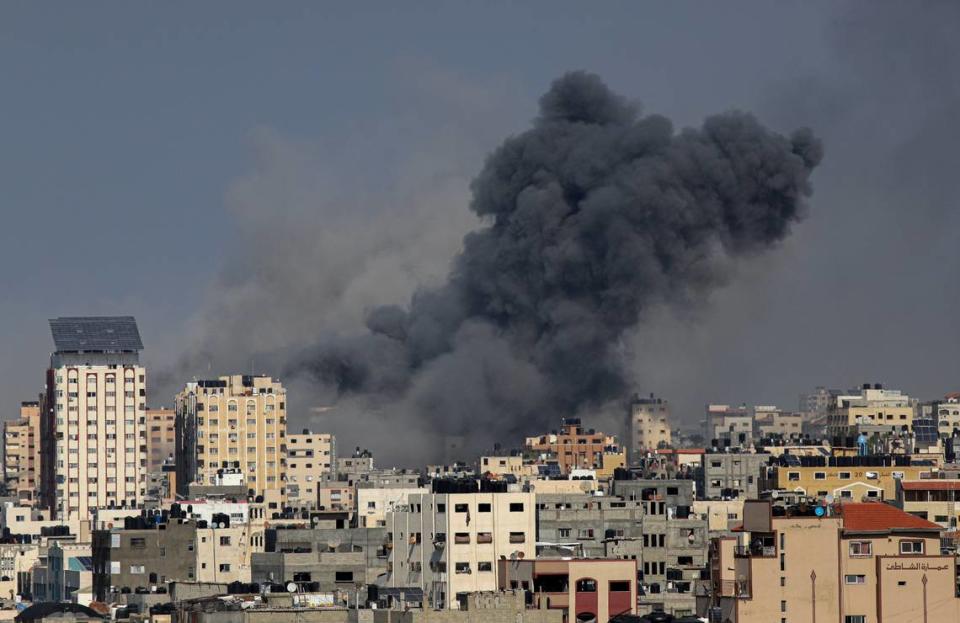
“It’s just a matter of time,” Amireh said. “It’s either people are just going to continue to die or they’re going to ... have people negotiate and stop it for another few months.”
Many of Amireh’s relatives living in Gaza were refugees from nearby areas who were pushed out after the wars in 1948 and 1967. Today, they’re among the 2.2 million Palestinians — half of whom are children — stuck in what Amireh and human rights groups consider the world’s largest open air prison.
The Gaza Strip, about twice the size of Washington, D.C., has been ruled by Hamas since the terrorist group won an election in 2006. But the area isn’t fully autonomous. There are no active airports because Israel controls the airspace. Palestinians must obtain permits, which are often denied, to travel abroad or to other parts of the Palestinian territories.
“They can’t go in. They can’t go out,” Amireh said. “If any of their kids have any kind of problems ... and have to go to a hospital in Egypt or even go to the West Bank, it’s almost impossible.”
For Amireh, however, the bloodshed and suffering of Gaza didn’t start last week. It’s been part of the Palestinian experience for more than 75 years — in Gaza but also in the West Bank, where most of his family now lives.
He said his relatives in the West Bank could receive water just once or twice a week. In Gaza, it could take longer. Basic necessities like electricity are much more limited in Gaza. After Hamas’ attack, Israel cut off water, fuel and electricity, which by extension affected water and sewage plants, raising public health concerns.
U.S. officials are trying to convince Israel to allow delivery of aid to Gaza’s civilians, humanitarian groups and hospitals. And on Tuesday, the health ministry told the Associated Press that an Israeli airstrike hit Gaza’s al-Ahli Hospital, killing more than 500 people. Israel denied firing at the hospital, saying that the destruction was caused by a failed rocket launch by Islamic Jihad.
It’s not unusual, Amireh said, to hear stories of Palestinians killed by Israeli forces or settlers. According to data from the United Nations from 2008 through September 2023, before the Hamas attack and Israel’s retaliation, more than 6,000 Palestinians civilians have been killed, the vast majority in the Gaza Strip. More than 300 Israeli civilians were killed during that same time frame.
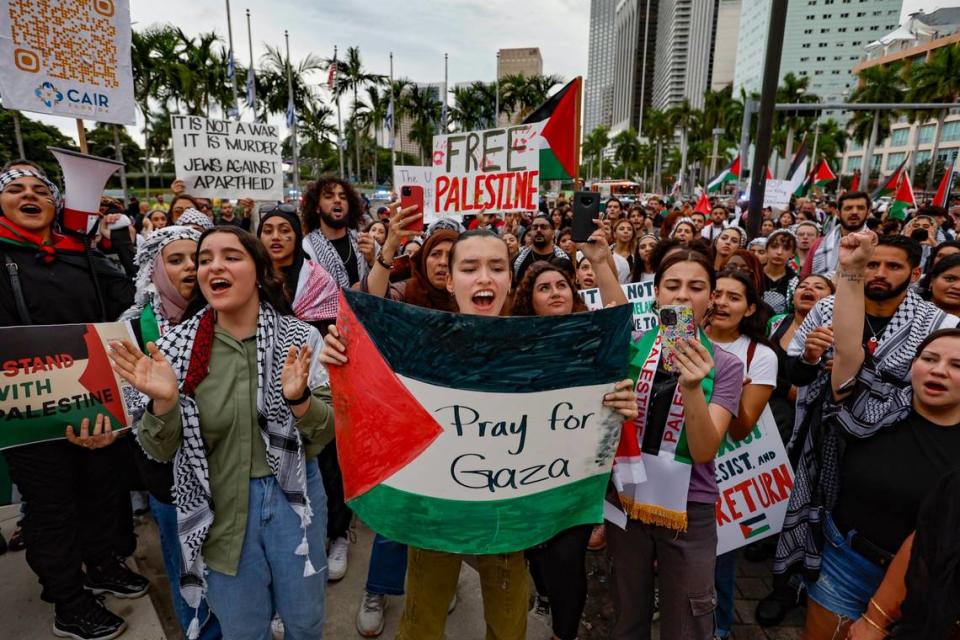
“The people that are paying the price and have been paying the price are the Palestinian civilians,” he said.
A lot of the poor conditions Palestinians live in, Amireh said, are directly tied to Israel not being held accountable by global powers, unlike how Russia is ostracized for its violence against Ukraine. Shireen Abu Akleh, a veteran Palestinian American reporter for Al Jazeera, is thought to have been killed by Israeli solider in 2022. Rachel Corrie, a 23-year-old American, was crushed to death by an Israeli bulldozer in 2003 while protesting the demolition of a Palestinian family’s home.
“Could you imagine then what are they doing to the [ordinary] Palestinians?” Amireh said.
And it’s about to get much worse, Amireh said.
“Now [Israel is] being given a green light, a free pass to go ahead and carpet bomb as much as you want, destroy and kill,” he said. “Everybody has the right to be mad when their civilians get killed. But the answer isn’t to kill other civilians.”
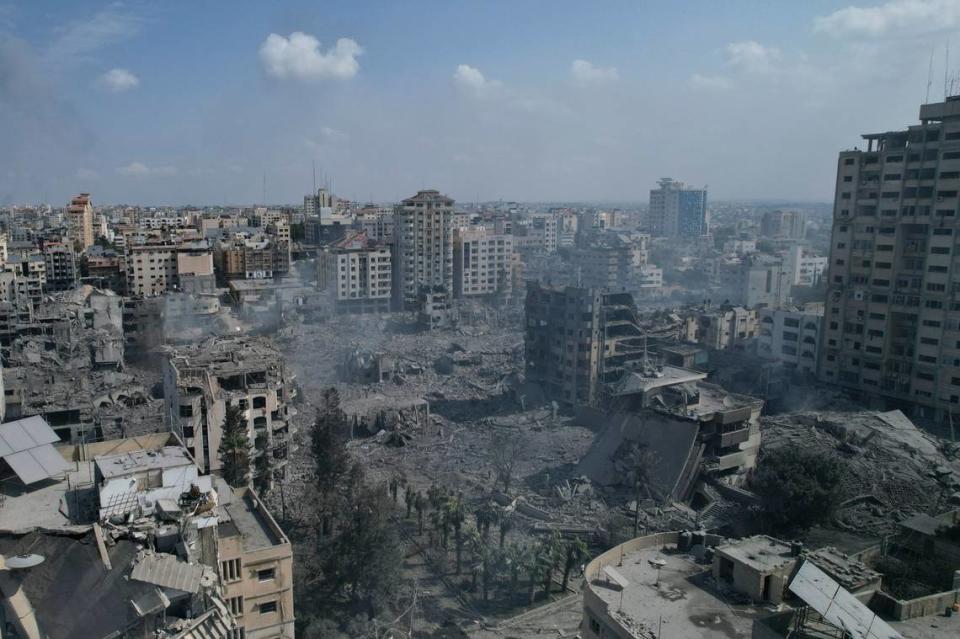
As airstrikes batter Gaza, the West Bank, which is occupied by Israel, has started to witness waves of violence, said Ovieda, a West Broward resident who asked not to be fully identified because she’s concerned for her and her family’s security. While she’s from the West Bank, she also has relatives in Gaza.
Oveida said the husband of one of her cousins has been trapped in Gaza for 18 years. The couple and their children were living in the Gaza Strip when Oveida’s cousin took a trip to visit her family in the West Bank.
She hasn’t been able to reunite with her husband. Oveida said she doesn’t even know if her husband — and her in-laws — have survived the Israeli bombing.
Oveida’s relatives in the West Bank share concerns over surging tensions after the attack by Hamas. At least 50 Palestinians have been killed in the West Bank since the war began in Gaza.
One of Oveida’s cousins, who is pregnant, saw her 5-year-old son get shot to death by an Israeli settler, she said. Her cousin was headed to a doctor’s appointment for a routine checkup.
“These incidents [are] happening on a daily basis, but they’re just not reported because there’s so many of them,” she said. “But unfortunately, it becomes the daily lives of the Palestinians.”
Oveida said her family — and many others — have been sheltering at home out of fear. Life in the West Bank is at a halt. People don’t step out of their homes unless they need to rush to a hospital or run out of food.
Her relatives, she said, constantly worry if their spouses, sons and daughters will make it home alive. Daily life for Palestinians stems beyond post-traumatic stress disorder.
“It’s a constant trauma,” she said. “There’s no break. You don’t catch a break as a Palestinian.”
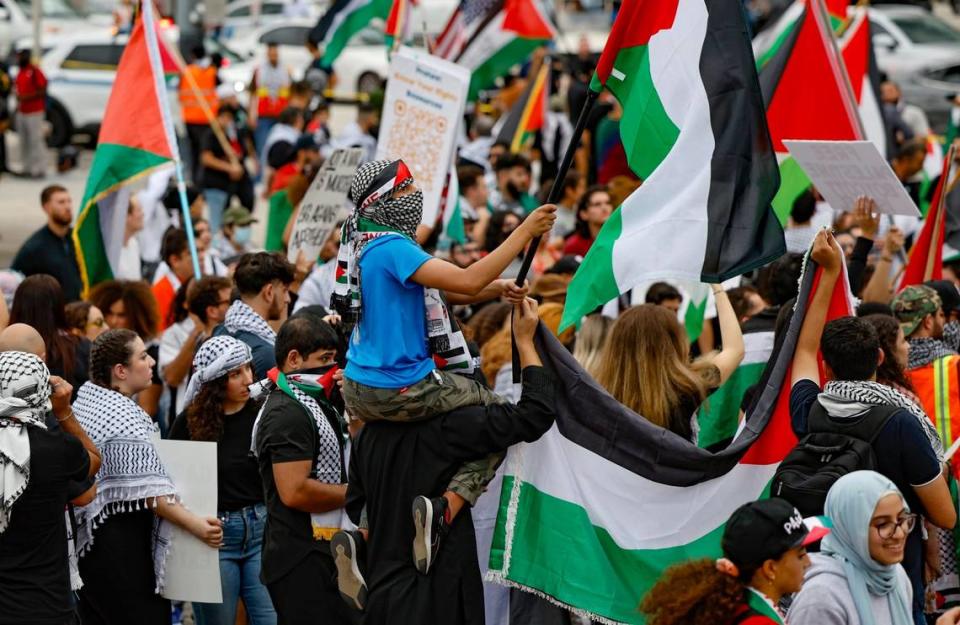
It has been that way for 75 years, she said. During the Nakba, which means catastrophe in Arabic, Palestinians were displaced and left their homes expecting to one day return. But that, Oveida said, didn’t happen. About 700,000 Palestinians were expelled during the Nakba.
Most Palestinians, she said, drew lessons from the Nakba and have decided that they won’t leave — even under dire circumstances — because they’ll end up as refugees for the rest of their lives. They have accepted that they could die, whether by a missile, their home collapsing, a stress-induced heart attack or starvation.
“People inside Gaza are not leaving,” she said. “The people in the West Bank, they know: ‘OK, it’s our turn next. They’re going to level Gaza, and the international community is not going to intervene.’”
For Oveida, Palestinians yearn to live. They want to raise their kids and watch them grow up, not mourn their deaths before they even get the chance to walk.
“Palestinians are one of the most gentle, compassionate people, most generous, loving, caring people you’ll ever meet,” she said. “But they’ve been brought [up] in the most brutal, merciless conditions that will turn anybody into like a stone.”
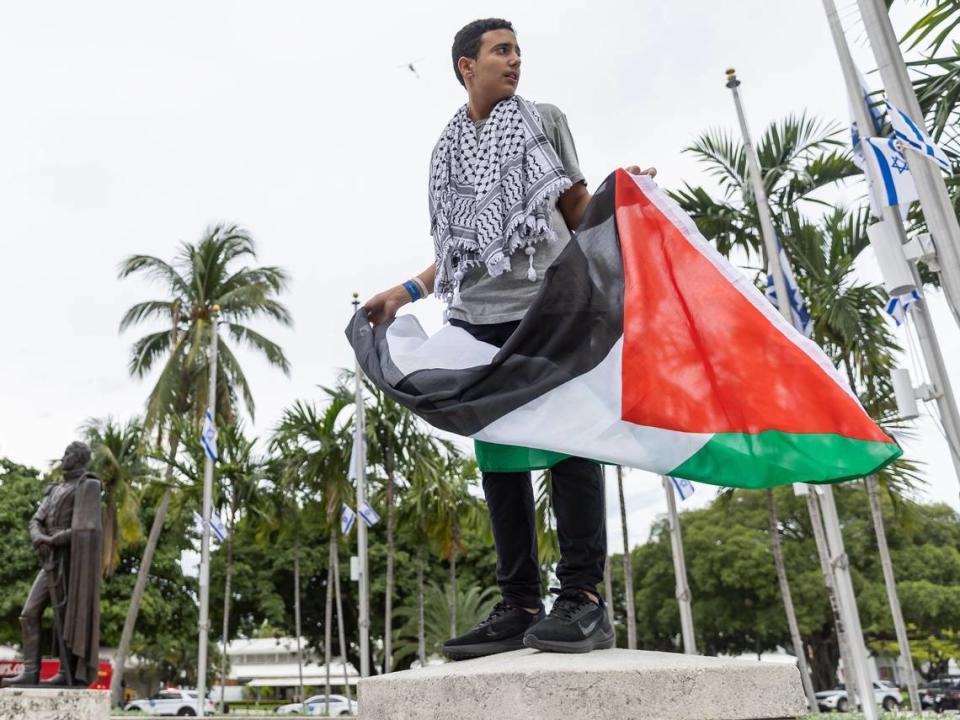
Most in the Palestinian diaspora share different variations of the same dream, Oveida said as her voice cracked.
I wish I could see my grandmother.
I wish I could visit my uncle’s grave.
I wish I could just go back home.

